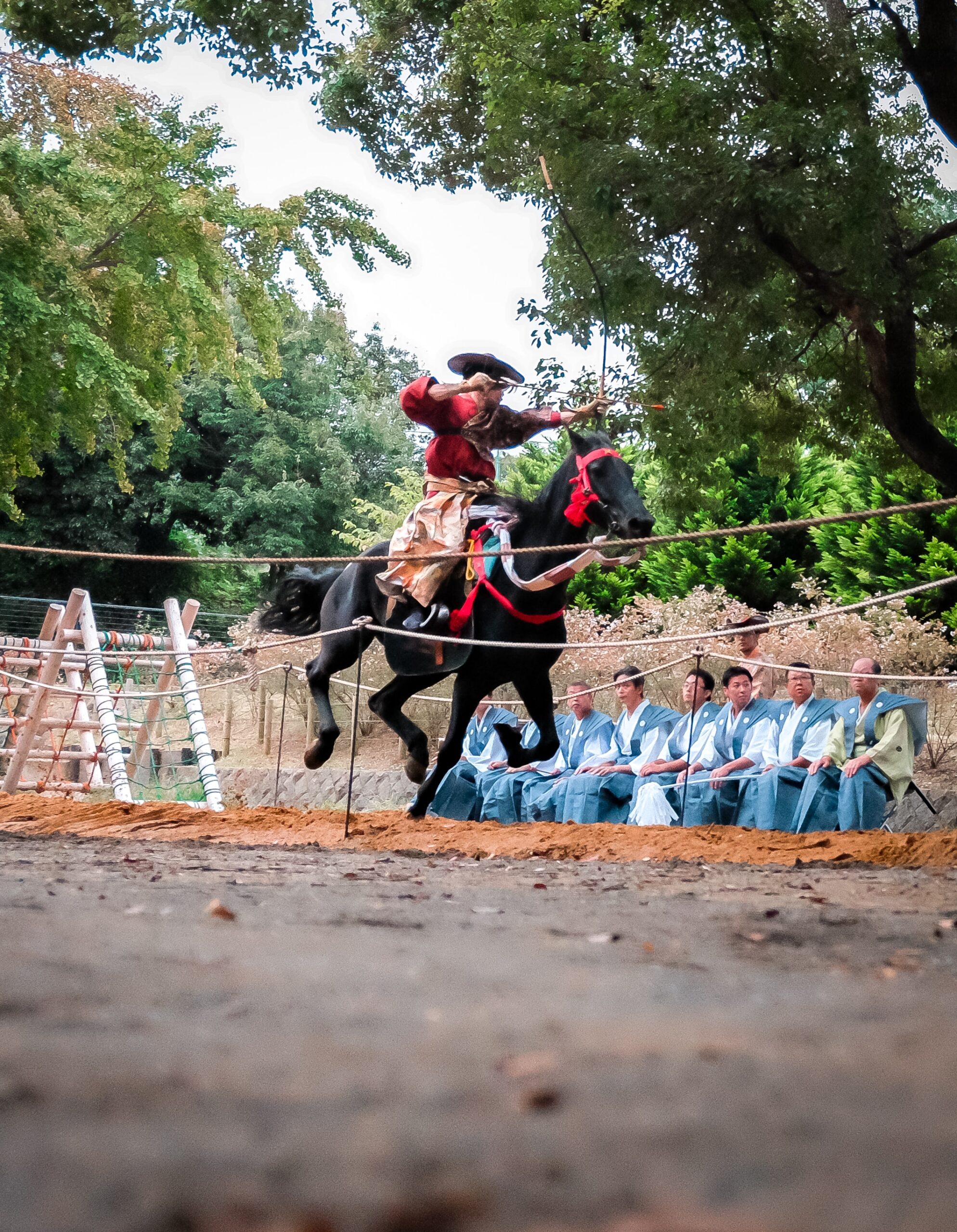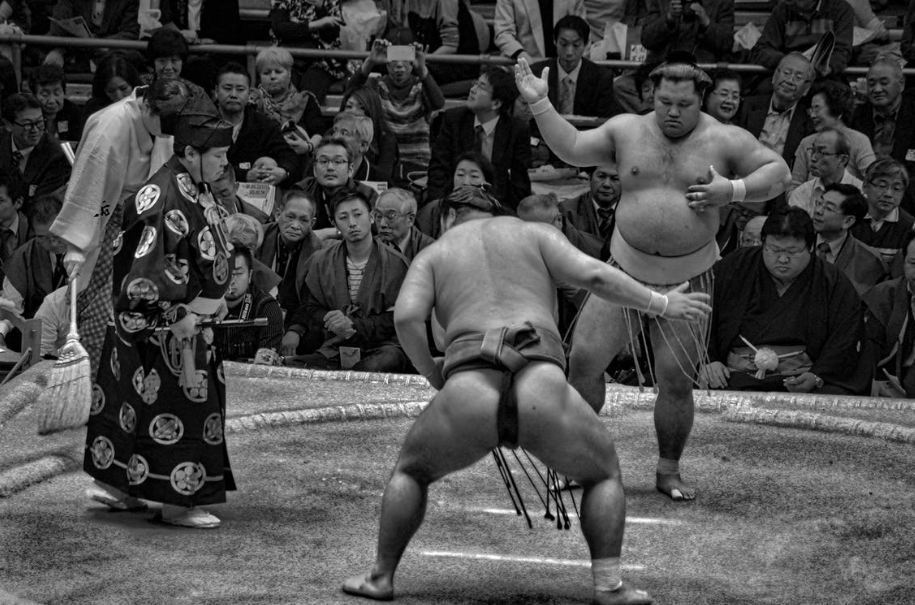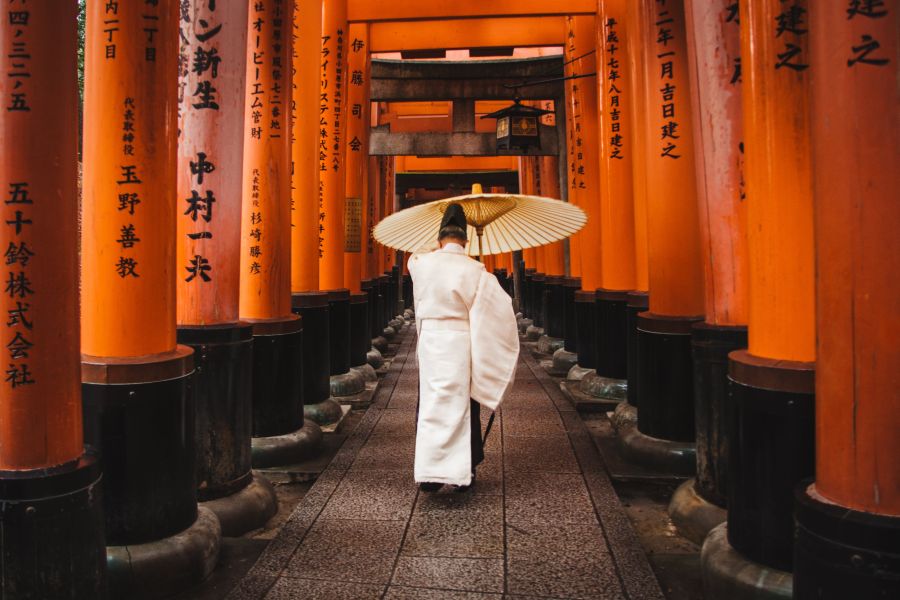What Was Code of Conduct for the Samurai and for All of Japanese Culture?

You're exploring Bushido, the centuries-old code of conduct that defined the samurai and shaped Japanese culture. Rooted in loyalty and warrior ethics, it blends influence from Neo-Confucianism, Shinto, and Zen Buddhism. The Bushido principles—rectitude, courage, benevolence, and respect—were central to samurai life, emphasizing honor and reputation. These values permeated Japanese society, nurturing respect and communal solidarity over individualism. Even today, Bushido drives business, education, and cultural interactions, reflecting a legacy of discipline, honor, and ethical conduct. If you're curious about how these ancient principles continue to shape modern Japan, there's much more to uncover.
Origins of Bushido
The origins of Bushido, the samurai's code of conduct, trace back to the early foundations of Japanese society. As you investigate this captivating history, you'll ascertain that Bushido wasn't just a set of rules but a way of life that emerged during Japan's feudal period. This code was deeply rooted in the concepts of feudal loyalty and warrior ethics, reflecting the turbulent times when samurai had to navigate complex social hierarchies and shifting allegiances. Influenced by Neo-Confucianism, Shinto, and Zen Buddhism, Bushido unified conduct and honor across diverse samurai clans, each interpreting the code distinctively.
Imagine living in a world where your status and survival depended on your loyalty to your lord. The samurai accepted this as a fundamental aspect of their identity, pledging unwavering loyalty and service. Feudal loyalty was more than just a duty; it was an honor that defined a samurai's place in society. Bushido also emphasized warrior ethics, instilling virtues such as courage, integrity, and respect. These ethics guided samurai not only in battle but in their interactions with others.
As you investigate these origins, you'll see how Bushido shaped the samurai's role and influenced Japanese culture. It laid the groundwork for the values and responsibilities that defined their existence.
Core Principles of Bushido

Amidst the tapestry of Bushido lies a set of core principles that define the essence of the samurai way of life. These principles form the backbone of their spiritual discipline and warrior ethics. As a practitioner of Bushido, you're guided by a strict moral code that emphasizes integrity and self-control. The following core principles serve as the foundation of this ancient code: Rectitude (Gi), which is about making the right decision based on reason rather than emotion. It's about being morally upright and just in all actions. Courage (Yu) isn't just about physical bravery. It involves the ability to face fear and act with strength and resilience in both battle and everyday life. As societal norms evolve with time, the essence of courage remains a timeless virtue. Benevolence (Jin) expects a warrior to show compassion and empathy, involving helping others and acting with kindness, even towards those you may not know. Respect (Rei) is vital, not only for others but also for oneself. It involves maintaining dignity and courtesy in all interactions, reflecting a refined and disciplined character.
Samurai and Honor

Honor forms the very heart of a samurai's existence, intertwining with every action and decision. When you examine the life of a samurai, you'll find that their commitment to honor is unwavering. Samurai ethics demand that they uphold their principles, no matter the personal cost. This deep-rooted sense of honor isn't just about personal pride but shapes their entire way of life. It's a constant guide, influencing how they interact with others, how they fight, and how they serve their lords.
In the samurai's world, the honor culture is paramount. You're expected to maintain your reputation, as losing it could lead to disgrace or even seppuku—a ritual suicide to restore lost honor. This commitment to maintaining one's honor isn't a mere suggestion; it's a core requirement of samurai ethics. The samurai's devotion to their code of conduct guarantees that they act with integrity and loyalty in all circumstances.
As a samurai, living honorably means embracing courage, justice, and compassion. By adhering to these values, you contribute to the broader honor culture that defines the samurai class. Your life is a reflection of the power and significance of honor.
Influence on Japanese Society
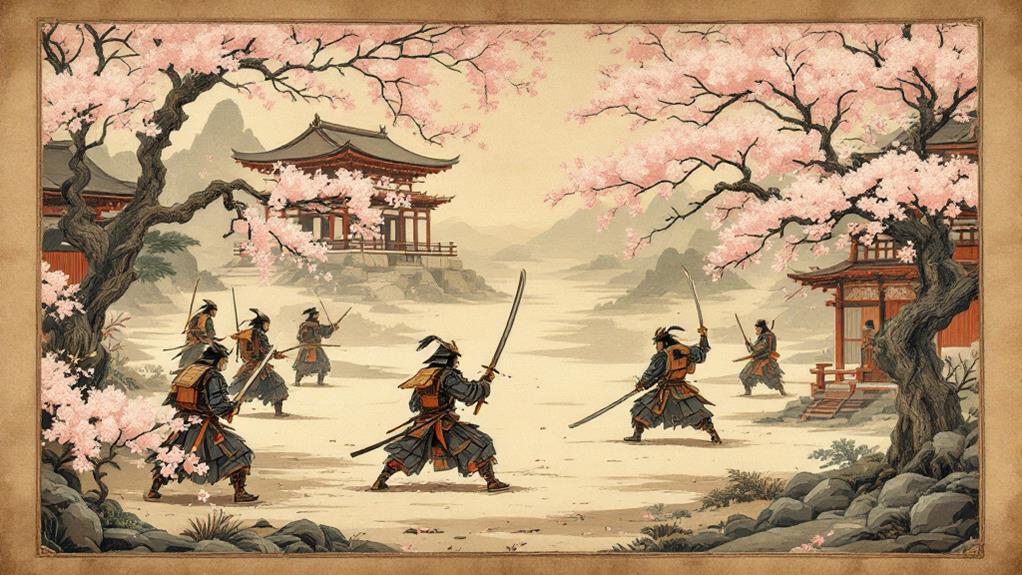
Shaping the cultural fabric of Japan, the samurai's code of conduct has left a profound impact on society. This code, while initially tailored for warriors, transcended to influence all layers of Japanese social hierarchy. You're likely to notice how these principles fostered a strong sense of duty and loyalty, which became crucial cultural values across the nation. Samurai ethics emphasized honor, integrity, and respect, shaping a society where these virtues remain central.
Consider the following ways in which this influence is evident:
- Respect for Authority: The samurai's adherence to their lords cultivated a lasting respect for authority figures within Japan's social hierarchy.
- Community Over Individual: The collective good was prioritized, reflecting a cultural value that continues to manifest in Japanese society today.
- Perseverance and Discipline: Samurai discipline inspired a national ethos of perseverance, critical in education and business sectors.
- Politeness and Manners: Integral to samurai conduct, politeness became a hallmark of Japanese cultural values, affecting everyday interactions.
Bushido in Modern Japan

In present-day Japan, the principles of Bushido, the samurai's code, remain influential in numerous aspects of life. You can see samurai values like loyalty, respect, and discipline reflected in diverse modern applications. In the business world, these values guide corporate culture, where employees often emphasize teamwork and dedication to their companies. You'll notice that many Japanese businesses prioritize long-term relationships and trust, echoing the samurai's commitment to their lords.
Education in Japan also showcases Bushido's impact. Students are taught to pursue excellence and respect authority, reflecting the discipline and honor central to samurai values. Schools encourage students to focus on self-improvement and perseverance, crucial traits for both personal and academic success.
Even in popular culture, Bushido makes its mark. Films, anime, and literature often highlight themes of honor and moral integrity, drawing from the samurai ethos. As you investigate these stories, you'll find characters embodying Bushido's principles, inspiring audiences to adopt similar values.
In modern applications, Bushido continues to shape Japan's social fabric. Regardless of professional settings, educational environments, or cultural narratives, the samurai's legacy lives on, influencing how individuals conduct themselves today.
Comparing Codes of Conduct
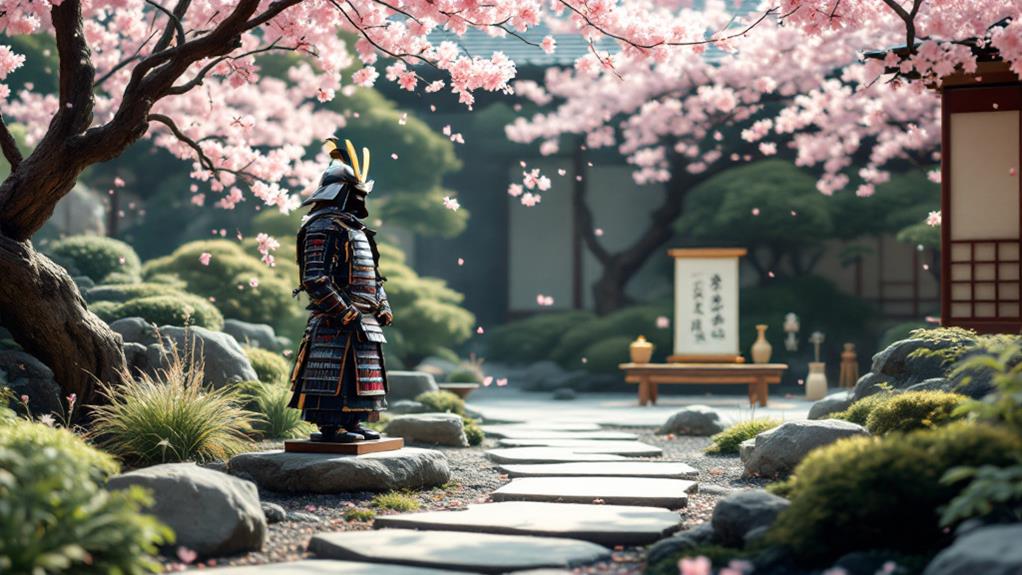
While Bushido's impact on Japanese society is undeniable, it's interesting to compare Bushido with other codes of conduct around the world. Samurai ethics, deeply rooted in honor, loyalty, and discipline, share similarities with diverse cultural values globally. For instance, the chivalric code of medieval European knights also emphasized honor and loyalty. However, Bushido and other codes differ in some aspects.
- Focus on Honor: Both Bushido and the European chivalric code prioritize honor, but the samurai ethics revolve around a more rigid discipline and loyalty to a feudal lord. In contrast, chivalry often included romantic notions of courtly love.
- Cultural Values: Confucian principles influenced Bushido, emphasizing respect and hierarchy. Meanwhile, indigenous African codes of conduct, like Ubuntu, focus on community and shared humanity.
- Spiritual Influence: Bushido incorporates Zen Buddhism, promoting mindfulness and self-control. In contrast, the Indian warrior code, Kshatriya Dharma, intertwines with Hindu principles, focusing on duty and righteousness.
- Conflict Resolution: While Bushido promotes resolving conflict through martial prowess, the Native American "Great Law of Peace" encourages diplomacy and consensus.
Enduring Legacy of Bushido

Beyond its historical roots, Bushido continues to influence modern society in diverse ways. You might not realize it, but the principles of Bushido, once guiding samurai ethics, still resonate today. In Japan, the values of loyalty, honor, and respect, foundational to Bushido, often permeate business practices and personal interactions. When you observe Japanese culture, you'll notice a strong emphasis on discipline and dedication, reflecting the samurai's commitment to their code.
Bushido rituals, once a daily practice for samurai, have subtly transformed into modern customs. For example, the careful attention to detail and ritualistic aspects of the Japanese tea ceremony echo the reverence and mindfulness inherent in Bushido. You can see how these rituals promote a sense of calm and focus, much like they did for the samurai.
Beyond Japan, Bushido's influence extends globally. Many have adopted its values, incorporating them into martial arts, leadership training, and even philosophical discussions. When you adopt these principles, you're tapping into a rich legacy that promotes ethical living and personal growth. Ultimately, the enduring legacy of Bushido inspires people worldwide to aim for integrity and honor, just as it did for the samurai centuries ago.
